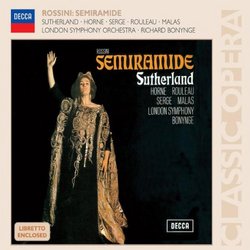| All Artists: Gioachino Rossini, Richard Bonynge, London Symphony Orchestra, Joan Sutherland, John Serge, Joseph Rouleau, Leslie Fyson, Marilyn Horne, Michael Langdon, Patricia Clark, Spiro Malas Title: Rossini: Semiramide Members Wishing: 1 Total Copies: 0 Label: Decca Release Date: 10/10/2006 Genre: Classical Style: Opera & Classical Vocal Number of Discs: 3 SwapaCD Credits: 3 UPC: 028947579182 |
Search - Gioachino Rossini, Richard Bonynge, London Symphony Orchestra :: Rossini: Semiramide
 | Gioachino Rossini, Richard Bonynge, London Symphony Orchestra Rossini: Semiramide Genre: Classical
|
Larger Image |
CD DetailsSimilar CDs
|
CD ReviewsA Far Fetched Story But A Great Musical Experience Timothy Kearney | Hull, MA United States | 07/15/2007 (5 out of 5 stars) "SEMIRAMIDE, an "opera seria" set in Babylon with a somewhat complicated plot where a widowed queen and mother like no other holds her throne for her long lost son who ends up killing her (at least in the original libretto), has all the elements that once made these operas such a success: vocal acrobatics required by the lead singers, a large orchestra and chorus, and a lavish setting. This work of Rossini, which was once one of his most popular works, is not staged that often today, due largely to the difficulties in finding performers who can do justice to the work. Every few years the work will be staged, usually at large houses such as The Metropolitan Opera in New York, and opera fans discover a hidden jewel. This recording is often considered the best studio recording available. Joan Sutherland as Semiramide and Marilyn Horne in a "trouser role" as the armed forces captain/long lost son Arsace is an excellent pairing for this opera. Both are in top vocal form and perform well together. Tenor John Serge is great at the flourishes required in the role of Idreno though at times his voice sounds a bit strained. The Ambrosian Opera Chorus has a full sound which is critical to this opera. The recording is held together by the conducting of Richard Bonynge who seems to have a love of the work and a respect for the music. This is the second time London/Decca has released this set. TRhe first time it was included in its mid-priced "Grand Opera" series. Other more recent recordings are more musically authentic as far as cuts and actual notes are concerned, but most listeners probably want the Rossini flourishes and vocal tricks that make his music lovable and this is the set that delivers it best. " Worth it for the Women S. Wells | California | 12/22/2007 (4 out of 5 stars) "I still remember how thrilled I was when I first heard this recording nearly 40 years ago. It still stands up very well, although it was in the vanguard of the revival of serious Rossini singing. Joan Sutherland and Marilyn Horne were a famous combination both on record and on stage. Here they are presented at the very height of their formidable combined powers. At this point, Dame Joan's voice is fresh and firm, free from the scoops, swoops and mannerisms that later became associated with her singing. Alas, even at the time of this recording, her pronunciation had begun to deteriorate. There's little drama in her portrayal of the Babylonian queen, but one can still revel in the sheer beauty of the voice and the blazing coloratura. Marilyn Horne, however, has plenty of passion and power. Here alone is ample evidence of why this magnificent artist was so instrumental in the revival of Rossini's serious operas. The voice is rich, the technique perfect and the coloratura brilliant. A breathtaking achievement! (I had the pleasure of seeing her Arsace in the theatre, as well as her Calbo in "Maometto II", the title role in "Tancredi" and her comic renditions of Rosina, Isabella and Cenerentola.) The men on this recording aren't so well represented. True, John Serge does a creditable job of the one aria he's allowed. But Joseph Rouleau (Assur) and Spiro Malas (Oroe) can't even fudge their fioratura. Richard Bonynge conducts his own, heavily cut, version of the score. As a point of reference, it's about 45 minutes shorter than Ion Marin's recording on DG using the critical edition published by the Rossini foundation. As a first, or only, recording of this opera, I'd recommend that on DG. But, no one who appreciates Rossini or coloratura singing will want to be without this set. The women are worth it! " Memories restored....and undiminished Grady Harp | Los Angeles, CA United States | 05/22/2010 (5 out of 5 stars) "Remember the days when we all donated our LP sets because of the advent of CDs? Unfortunately some of those recordings of yesteryear have not been duplicated - until now. SEMIRAMIIDE is a glorious example of this, a favorite of so many of us who were swept away by the magic delivered by the young Joan Sutherland and Marilyn Horne. Now it is here again - the 1965-66 recording with Richard Bonynge conducting the Ambrosian Opera Chorus and London Symphony Orchestra, allowing Sutherland and Horne all of the wondrous liberties to decorate the musical lines in the manner of true bel canto style that made them so stunning both on stage and on recordings - it is all here and as fresh as the day it was recorded.
Sutherland owned the role of Semiramide as did Marilyn Horne the role of Arsace. At the time this recording was made Bonynge and Henry Lewis (Bonynge married to Sutherland and Lewis to Horne) toured the country with concert pairings of 'Semiramide' and 'Iphigenie en Tauride' on adjoining nights, concerts that will remain ever in the minds of those who witnessed them. Both of these wonder women went on to conquer the opera world and this recording shows why. Just listen to Horne sing "Eccomi alfine in Babilonia... Ah! quel giorno ognor rammento" followed by Sutherland's inimitable "Bel raggio lusinghier... Dolce pensiero" and the two incomparable voices together in "Serbami ognor sì fido" and you get an idea of why they so successfully restored bel canto opera to 20th century audiences. The story of the opera is wonderfully absurd and the accompanying cast (including John Serge, Michael Langdon, Patricia Clark, Spiro Malas and Joseph Rouleau) rises to the standards of the two stars to make us accept the opera as simply a glorious heyday of brilliant singing. Before a decision is made to remove this 3 CD set from the market again, act quickly. This is one of the most successful operas on recordings ever made! Grady Harp, May 10" |

 Track Listings (11) - Disc #1
Track Listings (11) - Disc #1